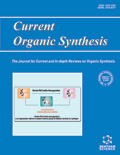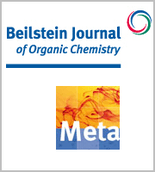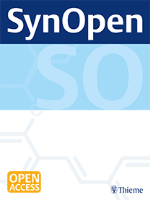
EUROPEAN JOURNAL OF ORGANIC CHEMISTRY
Scope & Guideline
Innovating Chemistry Through Rigorous Research
Introduction
Aims and Scopes
- Synthetic Methodologies:
The journal emphasizes the development of new synthetic methodologies, including innovative approaches for constructing complex organic molecules, utilizing various catalytic systems, and exploring new reaction conditions. - Catalysis:
A significant focus is placed on the study of catalytic processes, particularly transition metal catalysis and organocatalysis, aimed at enhancing the efficiency and selectivity of organic transformations. - Mechanistic Insights:
Research articles often delve into the mechanistic aspects of reactions, providing detailed analyses that contribute to a deeper understanding of organic reaction pathways. - Functional Materials:
The journal also covers the synthesis and characterization of functional organic materials, including polymers, dyes, and materials for energy applications, highlighting their potential uses in technology and industry. - Biological Applications:
Papers exploring the synthesis of biologically active compounds, including pharmaceuticals and agrochemicals, are prevalent, showcasing the journal's commitment to advancing medicinal chemistry. - Environmental Chemistry:
There is a growing interest in sustainable practices and green chemistry, with articles focusing on eco-friendly synthesis methods and the valorization of waste materials.
Trending and Emerging
- Photocatalysis:
There is a notable increase in research related to photocatalytic reactions, particularly those utilizing visible light to facilitate organic transformations, indicating a trend towards more sustainable and energy-efficient synthesis. - Sustainable Chemistry:
Research articles focusing on green chemistry principles and environmentally friendly synthesis methods are on the rise, reflecting a broader commitment within the scientific community to sustainability and reducing environmental impact. - Radical Chemistry:
The exploration of radical reactions, including radical polymerizations and radical-mediated transformations, has gained prominence, showcasing new methodologies that leverage radical intermediates for efficient synthesis. - Bioconjugation and Bioorthogonal Chemistry:
Emerging research in bioconjugation techniques and bioorthogonal reactions highlights the intersection of organic chemistry with biological applications, particularly in drug development and targeted therapies. - Machine Learning in Organic Synthesis:
The integration of computational methods and machine learning in the design and optimization of organic reactions is gaining traction, signifying a trend towards data-driven approaches in organic synthesis.
Declining or Waning
- Traditional Organic Synthesis:
Classic organic synthesis methods, while still relevant, have seen a decrease in focus as researchers increasingly explore more innovative and efficient methodologies that align with sustainable practices. - Conventional Reaction Mechanisms:
Research centered on well-established reaction mechanisms has waned, as there is a growing emphasis on novel pathways and mechanistic insights that challenge traditional views. - Inorganic and Organometallic Chemistry:
Although still a component of organic chemistry, the specific focus on inorganic and organometallic synthesis within organic contexts has diminished, possibly due to the rise of interdisciplinary research involving broader chemical fields.
Similar Journals

Canadian Journal of Chemistry
Diving Deep into the World of ChemistryWelcome to the Canadian Journal of Chemistry, a prominent publication dedicated to advancing the study of chemistry through original research and critical reviews. Published by Canadian Science Publishing, this journal has been a cornerstone of chemical research since its inception, covering a broad spectrum of topics within the field, including catalysis, organic chemistry, and general chemistry. With an ISSN of 0008-4042 and E-ISSN of 1480-3291, it provides a vital platform for researchers, professionals, and students to disseminate their findings and engage in scholarly discourse. Impact Factor is currently in development, with the journal classified in the Q4 category for catalysis and Q3 for miscellaneous chemistry fields, signifying its evolving contributions to the scientific community. The journal operates without an open access model, which ensures a rigorous peer-review process while maintaining subscription access for institutions and libraries. Located in Ottawa, Canada, the Canadian Journal of Chemistry continues to provide an invaluable resource for those dedicated to the scientific pursuit of chemistry, making significant strides in fostering interdisciplinary approaches and innovative research methodologies.

RUSSIAN JOURNAL OF GENERAL CHEMISTRY
Unveiling Breakthroughs in Chemical ScienceThe Russian Journal of General Chemistry is a prominent scholarly publication dedicated to advancing the field of general chemistry. Published by MAIK NAUKA/INTERPERIODICA/SPRINGER, this journal contributes significantly to the global chemistry landscape, offering a platform for researchers and professionals to share their latest findings and methodologies. With an ISSN of 1070-3632 and an E-ISSN of 1608-3350, it has established itself as a resource for high-quality research articles since its inception in 1996. Though currently indexed in the Q4 category for chemistry (miscellaneous) and ranking #299 out of 408 in general chemistry according to Scopus, the journal remains an important venue for academic contributions that bridge gaps in traditional chemical disciplines. Desiring to cater to a diverse range of interests within chemistry, the journal actively encourages submissions that reflect significant scientific achievements, innovations, and collaborative studies. Although the journal does not currently offer open access, its role in disseminating crucial chemical research cannot be overstated. Researchers and students alike will find valuable insights and rigorous scientific discourse in its pages.

Nature Reviews Chemistry
Advancing the Frontiers of Chemical KnowledgeNature Reviews Chemistry is a premier journal published by NATURE PORTFOLIO, dedicated to advancing scholarly discourse in the broad field of chemistry. With an impressive impact factor and a ranking in the 99th percentile across its categories—ranked #2 in General Chemical Engineering and #4 in General Chemistry according to Scopus—this journal is recognized for its high-quality, peer-reviewed articles that synthesize and analyze the latest advancements in chemical research. Operating under a convergence framework from 2017 to 2024, Nature Reviews Chemistry aims to provide comprehensive insights and critical examinations of contemporary chemical practices, thereby reinforcing its status as a vital resource for researchers, professionals, and students alike. Although it is not an open-access journal, the breadth and authority of its content make it essential for those looking to stay at the forefront of chemical sciences.

CURRENT ORGANIC SYNTHESIS
Exploring New Horizons in Organic SynthesisCURRENT ORGANIC SYNTHESIS, published by Bentham Science Publishers Ltd, is a leading journal in the field of organic chemistry and biochemistry that serves as a vital platform for researchers and professionals advancing the synthesis of organic compounds. With an ISSN of 1570-1794 and an E-ISSN of 1875-6271, it boasts a significant impact within its category, ranked in the Q3 quartile for both biochemistry and organic chemistry as of 2023. The journal covers innovative research and reviews that enhance our understanding of organic synthesis methodologies, showcasing contributions that advance the field. Operating from Sharjah, United Arab Emirates, CURRENT ORGANIC SYNTHESIS has evolved since its inception in 2005, providing access to a wealth of information essential for students, professionals, and researchers alike. While it currently does not offer open access, the journal continues to maintain a strong community of scholars dedicated to fostering dialogue and innovation in the organic sciences.

HELVETICA CHIMICA ACTA
Pioneering Insights in Biochemistry and BeyondHELVETICA CHIMICA ACTA, published by WILEY-V C H VERLAG GMBH, stands as a pivotal journal in the fields of chemistry and chemical research. Established in 1918, this esteemed journal spans a diverse array of topics, including biochemistry, catalysis, drug discovery, inorganic and organic chemistry, as well as physical and theoretical chemistry. With influence reflected in its noteworthy Q2 and Q3 quartile rankings across these categories as of 2023, HELVETICA CHIMICA ACTA continues to capture the interest of the global scientific community. Although not an open-access journal, it remains accessible through various academic institutions, ensuring broad reach and collaboration opportunities. Researchers, professionals, and students alike will find its meticulously peer-reviewed articles critical for advancing knowledge and fostering innovation within the chemical sciences. As the journal converges toward 2024, it remains committed to publishing high-quality, impactful research that supports the evolution of chemistry across its multifaceted disciplines.

INDIAN JOURNAL OF HETEROCYCLIC CHEMISTRY
Empowering Scientific Dialogue in Heterocyclic ChemistryINDIAN JOURNAL OF HETEROCYCLIC CHEMISTRY, published by CONNECT JOURNALS, is a vital resource in the fields of organic chemistry and biochemistry, aiming to advance research and promote innovation within the realm of heterocyclic compounds. Established in 1996, this journal has successfully converged into an influential publication with a commitment to disseminating high-quality, peer-reviewed research articles that enhance the understanding of heterocyclic chemistry applications. Although it currently holds a Q4 quartile ranking in both biochemistry and organic chemistry according to the 2023 categorizations, its broader contributions to the scientific community should not be underestimated, as it seeks to support the ongoing dialogue among researchers, professionals, and students. The journal operates from Ghaziabad, India, providing open access to its publications, thereby fostering a collaborative and informative environment for its international readership. With an ISSN of 0971-1627 and a special focus on contemporary challenges and developments in the field, the INDIAN JOURNAL OF HETEROCYCLIC CHEMISTRY is poised to make a significant impact as it continues to evolve through 2024 and beyond.

Beilstein Journal of Organic Chemistry
Advancing the frontiers of organic chemistry research.The Beilstein Journal of Organic Chemistry, published by the renowned BEILSTEIN-INSTITUT, stands as a pivotal platform for advancing the field of organic chemistry since its inception in 2005. With its commitment to Open Access publishing, this journal enables global readership and collaboration, fostering the dissemination of high-quality research. Operating from Germany, the journal has carved out a significant reputation, currently holding a Q2 ranking in the Organic Chemistry category, with impressive Scopus rankings placing it at #91 out of 211 in the field, achieving a 57th percentile. The Beilstein Journal is dedicated to publishing cutting-edge findings that span the breadth of organic chemistry, including synthetic methodologies, catalysis, and material sciences, making it an essential resource for researchers, professionals, and students looking to stay at the forefront of organic chemistry advancements. With a vision to enhance collaboration and knowledge sharing within the scientific community, the journal plays a vital role in shaping the future of organic chemistry research.

SynOpen
Advancing Knowledge Across DisciplinesSynOpen is an esteemed open-access journal published by GEORG THIEME VERLAG KG, based in Germany, dedicated to advancing the fields of Biomaterials, Catalysis, Materials Science, and Organic Chemistry. Since its inception in 2017, the journal has established itself as a vital platform for researchers wishing to disseminate their findings in a rapidly evolving scientific landscape, earning a commendable Q2 ranking in Materials Science (miscellaneous) and Q3 in other key categories for 2023. With an increasing impact on its disciplines, SynOpen aims to foster interdisciplinary collaboration and innovation by providing unrestricted access to high-quality research, thus promoting a broader reach and visibility for authors. Scholars, professionals, and students alike can benefit from the comprehensive range of topics covered, as the journal's commitment to presenting cutting-edge studies and methodologies positions it as a crucial resource for contemporary scientific inquiry.

CHINESE JOURNAL OF CHEMISTRY
Exploring innovative solutions in the chemical sciences.The CHINESE JOURNAL OF CHEMISTRY, published by WILEY-V C H VERLAG GMBH, is a distinguished peer-reviewed journal that has been contributing to the field of chemistry since its inception in 1990. With an impressive Q1 ranking in the Chemistry (miscellaneous) category and a Scopus rank of 67 out of 408, this journal is recognized for its rigorous scholarly standards and significant impact within the academic community. Renowned for publishing high-quality research, reviews, and insightful commentaries, the journal serves as a vital resource for researchers, professionals, and students keen on advancing their understanding of general chemistry and its applications. Although it does not offer open access, the journal remains an essential outlet for innovative chemistry research, attracting contributions from a global network of specialists. With its broad scope covering various aspects of chemistry and a commitment to fostering scientific dialogue, the CHINESE JOURNAL OF CHEMISTRY is poised to continue its role as a central pillar in the ever-evolving landscape of chemical sciences.

REVUE ROUMAINE DE CHIMIE
Advancing Chemistry: Bridging Local Insights with Global ImpactREVUE ROUMAINE DE CHIMIE is a distinguished academic journal in the field of chemistry, published by EDITURA ACAD ROMANE in Romania. With an ISSN of 0035-3930, this journal has been a valuable platform for disseminating original research and insights in the diverse realm of chemistry since its inception. The journal currently operates under a competitive tier, categorized in Q4 for miscellaneous chemistry fields, as reflected in its Scopus ranking of #348 out of 408, placing it within the 14th percentile. Aiming to foster scientific discourse and innovation, the REVUE ROUMAINE DE CHIMIE provides a repository of knowledge that is crucial for researchers, professionals, and students eager to advance their understanding and contribute to the global chemistry community. By bridging local and international research initiatives, this journal plays an essential role in enhancing the visibility of Romanian scientific contributions on the world stage.